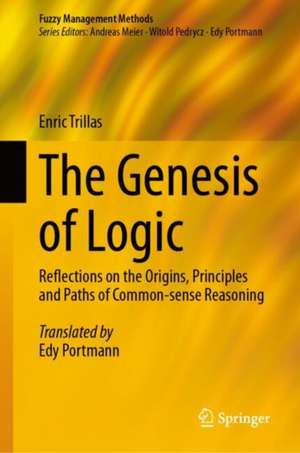The Genesis of Logic: Reflections on the Origins, Principles and Paths of Common-sense Reasoning: Fuzzy Management Methods
Autor Enric Trillas Traducere de Edy Portmannen Limba Engleză Hardback – 24 mai 2024
Din seria Fuzzy Management Methods
- 18%
 Preț: 1001.81 lei
Preț: 1001.81 lei - 20%
 Preț: 554.98 lei
Preț: 554.98 lei - 20%
 Preț: 558.63 lei
Preț: 558.63 lei -
 Preț: 371.58 lei
Preț: 371.58 lei - 20%
 Preț: 568.44 lei
Preț: 568.44 lei -
 Preț: 367.70 lei
Preț: 367.70 lei - 15%
 Preț: 643.00 lei
Preț: 643.00 lei - 18%
 Preț: 946.87 lei
Preț: 946.87 lei -
 Preț: 370.19 lei
Preț: 370.19 lei - 15%
 Preț: 635.31 lei
Preț: 635.31 lei - 18%
 Preț: 784.79 lei
Preț: 784.79 lei - 18%
 Preț: 781.62 lei
Preț: 781.62 lei - 15%
 Preț: 632.22 lei
Preț: 632.22 lei - 18%
 Preț: 939.77 lei
Preț: 939.77 lei - 18%
 Preț: 727.97 lei
Preț: 727.97 lei
Preț: 724.00 lei
Preț vechi: 882.92 lei
-18% Nou
Puncte Express: 1086
Preț estimativ în valută:
138.55€ • 150.45$ • 116.39£
138.55€ • 150.45$ • 116.39£
Carte disponibilă
Livrare economică 01-15 aprilie
Preluare comenzi: 021 569.72.76
Specificații
ISBN-13: 9783031550393
ISBN-10: 3031550390
Pagini: 110
Ilustrații: XVIII, 110 p.
Dimensiuni: 155 x 235 mm
Greutate: 0.34 kg
Ediția:2024
Editura: Springer Nature Switzerland
Colecția Springer
Seria Fuzzy Management Methods
Locul publicării:Cham, Switzerland
ISBN-10: 3031550390
Pagini: 110
Ilustrații: XVIII, 110 p.
Dimensiuni: 155 x 235 mm
Greutate: 0.34 kg
Ediția:2024
Editura: Springer Nature Switzerland
Colecția Springer
Seria Fuzzy Management Methods
Locul publicării:Cham, Switzerland
Cuprins
1. Introduction.- Part I: The Skeleton of Reason.- 2. A formal skeleton of reason.- 3. Reason in light of the skeleton.- Part II: The Model of Precise Reasoning.- 4. Boolean algebras come with lots of laws.- 5. With fewer laws: ortho-lattices and De Morgan algebras.- 6. Conjectures on ortho-lattices and De Morgan algebras.- Part III: Models of Imprecise Reasoning.- 7. Meanings and calculations using imprecise concepts.- 8. Fuzzy basic algebras, with fewer and more laws.- 9. On truth and its relationship with inference.- Part iv: Reasoning and Meaning.- 10. The effective possibility of reasoning.- 11. Last comments and conclusion.
Notă biografică
Enric Trillas is a Spanish scientist specializing in fuzzy logic and artificial intelligence. He has held various academic positions, including professorships at the Polytechnic University of Catalonia and the Polytechnic University of Madrid. Trillas has contributed over 200 research articles to specialized journals and served as a member of the editorial board for Journal on Intelligent Systems. He has authored several notable works on fuzzy logic, such as "Conjuntos borrosos" (1980) and "Introducción a la lógica borrosa" (1995). Trillas is a member of prestigious scientific societies and has received awards for his contributions, including the European Pioneer Award in 1999.
About the Translator:
Edy Portmann is the Swiss Post Professor of Computer Science at the University of Fribourg, Switzerland. His professorship aims to advance cognitive computing research by utilizing soft computing methods and applying them in variousfields, supported by network industries like Swiss Post. The focus is on enhancing user experiences, particularly in the context of smart and cognitive cities, through improved interaction, learning, and integration of computing with words and perceptions. Additional areas of interest include knowledge aggregation, automation, representation, reasoning using fuzzy cognitive maps and ontologies, as well as big data analytics and management utilizing fuzzy methods and systems.
Textul de pe ultima copertă
The Genesis of Logic addresses the principles of common-sense reasoning, which are employed in everyday decision-making processes and extend beyond deductive reasoning alone. Linked to language, logic inherits its flexibility. These are a few laws, the 'formal skeleton of reasoning,' based on the relationship of linguistic inference that, while needing to be represented in each context, allow for the consideration of non-comparable, orthogonal statements. By facilitating deduction and abduction, speculation emerges as a fundamental intellectual operation. As a whole, this work offers a new genetic-evolutionary perspective to reconsider Logic, a panoramic outlook that examines laws outside the skeleton as local laws, necessary for the validity of specialized reasoning. It moves away from the rigid reticular structure of sets of statements and views induction as the search for speculations, non-monotonic reasoning as speculative, and conjecture, only proven in finite Boolean algebras, that reasoning involves following paths of inference in a zigzag pattern, alternating between deduction and abduction.
Caracteristici
Reveals the origins of common-sense reasoning, language, and deduction in this panoramic outlook Flexibly transcends deductive reasoning Explores the dynamic interplay between deduction and abduction, reshaping traditional notions of reasoning
